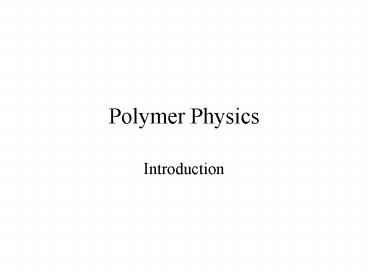Polymer Physics PowerPoint PPT Presentation
1 / 18
Title: Polymer Physics
1
Polymer Physics
- Introduction
2
Polymers
- Historical Introduction
- Types of Polymer Materials
- Scaling in Random Walks
- Regimes of Polymer Solution
- Dynamical Properties of Polymer Materials
3
Heating a rubber band (Gough 1805)
F U - TS
Elasticity of rubber is entropic
4
Macromolecules or polymers (Staudinger, 1920s)
Reason for rubber elasticity stretched polymer
has lower entropy
5
Huge variety of polymeric materials
Polymer solution polymers are dissolved in a
solvent (e.g. water)
Examples RNA or proteins in the cellular
cytoplasm
Polymer melt limit of high polymer concentration
Examples plastic bags, Silly Putty
6
More polymer materials
Polymer gels crosslinked networks of polymers
With or without solvent
Various kinds of crosslinking
7
Copolymers
www.physics.nyu.edu/ pine/research/nanocopoly.html
8
yet more polymer materials
Crystals
For example, those prepared for X-ray
crystallography
Liquid Crystals
Polymers with orientational order
9
The Ideal Chain
The ideal gas of polymer physics
A random walk where the steps are
statistically independent
10
Self-Avoiding Random Walks
Real polymers dont intersect themselves or other
polymers
New scaling exponent ? depends on dimensionality
Florys mean-field estimate
11
Regimes of Polymer Solution
Two parameters polymer density and solvent
quality
Parameter 1 density of polymer
1.There is a semi-dilute regime solvent still
takes up much more volume than polymer, but
spheres of radius R0 around each polymer have
considerable overlap 2. Florys Theorem Chains
in a dense melt are ideal!
12
Some Theoretical Tools
Self-consistent mean field theory
Scaling Concepts (de Gennes) Very similar to
scaling analysis of vicinity of critical
point Renormalization group methods
13
Regimes of Polymer Solution
Parameter 2 Quality of solvent (Coil-globule
transition)
good solvent
bad solvent
Between good and bad solvents, there is
a theta solvent where chains are ideal.
14
Dynamics of Polymer Materials
Earliest model Rouse model (1953) describes
the dynamics of a single chain in an external
field
- Assumptions
- Chains are ideal
- Phantom chains (can pass through each other)
- Response to forces is local
Prediction diffusion constant of a polymer in
solution
15
Dynamics of Polymer Materials
In solutions, there are long-range
hydrodynamic Interactions between monomers.
- Assumptions
- Chains are ideal
- Phantom chains (can pass through each other)
- Response to forces is local
Zimm model takes these into account Prediction
16
Dynamics of Polymer Materials
Reptation model takes into account entanglement
effects.
- Assumptions
- Chains are ideal
- Phantom chains (can pass through each other)
- Response to forces is local
Polymer materials can be viscoelastic. Response
is then elastic on short time scales, viscous
on long time scales (Silly Putty)
17
Summary
1. There is a great variety of polymer
materials 2. Ideal and self-avoiding random walks
are fundamental in describing polymer
materials 3. There are distinct regimes of
polymers in solution determined by density and
interactions with solvent 4. Polymer materials
have interesting dynamical behavior (for example,
viscoelasticity)
18
Possible Topics for last few talks
- Biopolymers (focus on DNA or proteins?)
- Simulation methods
- Focus on some application
- Liquid crystals
- Return to some topic in more detail
- ?

